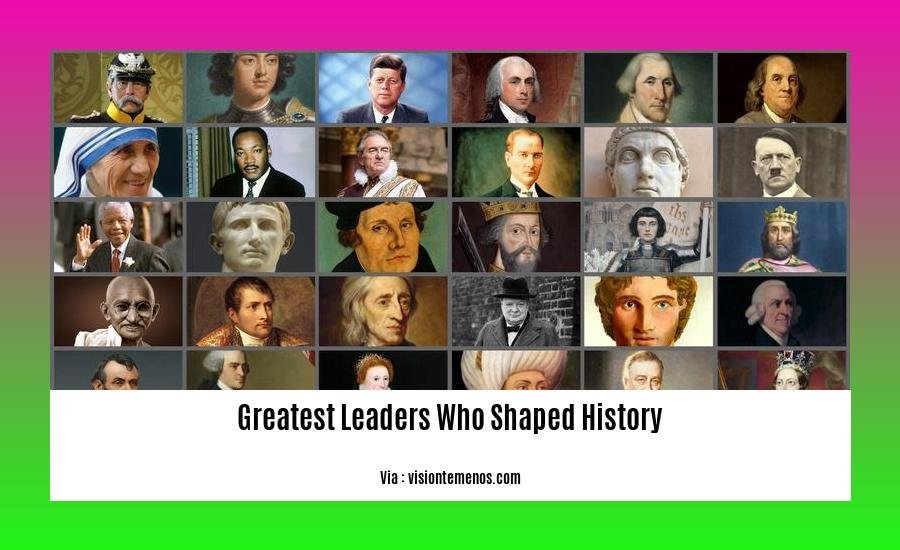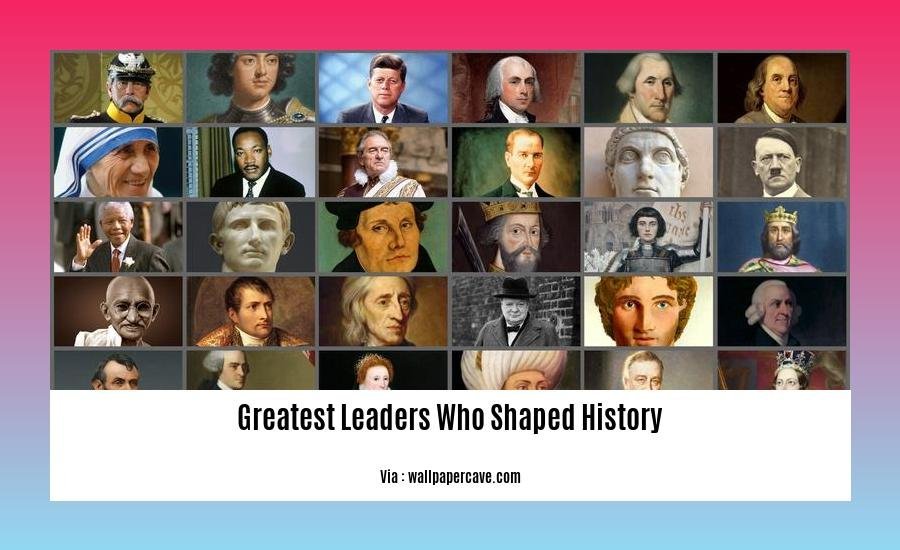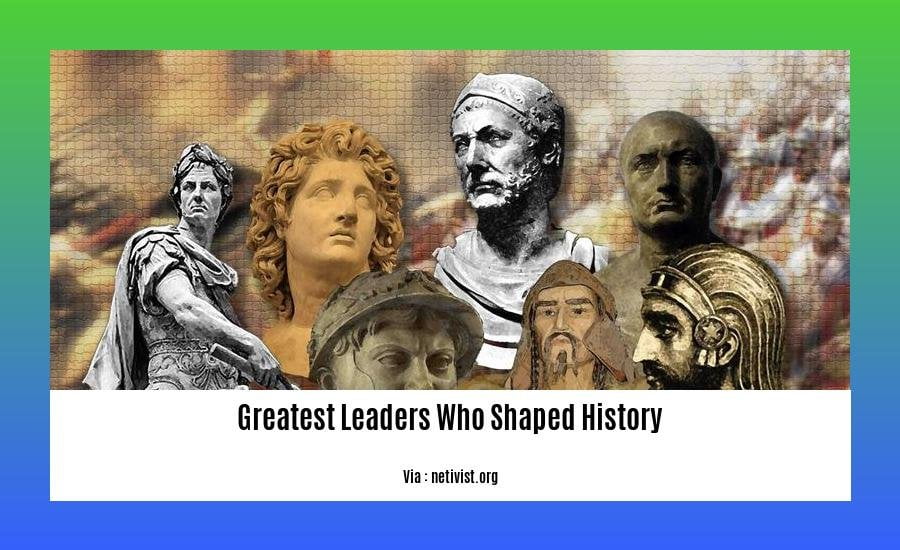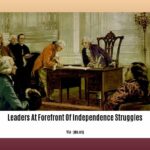Step into the annals of time and discover The Greatest Leaders Who Shaped History. As we delve into the lives and legacies of these extraordinary individuals, we will explore the enigmatic qualities that propelled them to the forefront of human civilization. From ancient emperors to modern-day visionaries, each of these leaders left an enduring mark on the tapestry of our existence, forging the path for progress, innovation, and societal transformation. Through their bold decisions, unwavering determination, and profound understanding of human nature, they shaped the course of nations, inspired generations, and continue to serve as beacons of leadership for all who seek to make a meaningful impact on the world.
Key Takeaways:

- Ancient world leaders, like Hammurabi and Qin Shi Huang, established legal frameworks and unified vast territories.
- Cyrus the Great and Alexander the Great made significant military conquests that expanded their empires.
- Hatshepsut promoted art and architecture, leaving a lasting legacy in Egypt.
- Julius Caesar’s political reforms shaped the Roman Empire’s history.
- Charlemagne unified Europe and promoted religious and cultural unity.
- Resilience and adaptability are common traits found in great leaders.
Greatest Leaders Who Shaped History
Throughout history, countless individuals have emerged as great leaders who shaped history, leaving an enduring legacy on their societies and the world at large. From ancient emperors to modern revolutionaries, these leaders have played a pivotal role in shaping political landscapes, social institutions, and cultural norms.
They have inspired us with their vision, determination, and leadership qualities. By studying their lives and legacies, we can gain insights into the challenges and opportunities faced by leaders, as well as the enduring impact that they can have on society.
Prominent Leaders and Their Legacies
Some of the most influential great leaders who shaped history:
Alexander the Great: A brilliant military strategist and conqueror, Alexander’s empire stretched from Greece to India. His legacy continues to inspire leaders today.
Julius Caesar: A charismatic Roman general and politician, Caesar played a key role in the transition from the Roman Republic to the Roman Empire.
Genghis Khan: A fearsome Mongol warrior and empire-builder, Genghis Khan’s conquests established the largest contiguous empire in history.
Queen Elizabeth I: England’s “Virgin Queen,” Elizabeth I presided over a period of prosperity and cultural flourishing known as the Elizabethan Era.
Napoleon Bonaparte: A brilliant military commander and Emperor of France, Napoleon’s campaigns reshaped Europe and influenced military strategy for centuries.
Mahatma Gandhi: A nonviolent resistance leader, Gandhi played a pivotal role in India’s independence from British rule.
Nelson Mandela: South Africa’s first black president, Mandela fought against apartheid and became a global symbol of freedom and reconciliation.
To learn more about the greatest political leaders in history, click here to read about their accomplishments and impact on the world.
If you’re interested in discovering the most famous political leaders of all time, click this link to explore their lives and contributions.
For those fascinated by the extraordinary individuals who shaped history, discover the inspiring stories of political leaders who made history.
Genghis Khan
Key Takeaways:
- Abolished traditional aristocratic titles: To prevent tribal warfare and promote meritocracy.
- Prohibited societal ills: Such as selling and kidnapping of women, enslavement of Mongols, and livestock theft.
- Strategic leadership: Genghis Khan placed competent allies in key positions and executed leaders of enemy tribes.
- Descendants: He had millions of descendants, with approximately 1 in 200 men being direct descendants.
- Empire expansion: His empire continued to grow even after his death in 1227.
Citation:
- Genghis Khan – Descendants, Empire & Facts | HISTORY:
Queen Elizabeth I
In the annals of history, few rulers embody the essence of leadership like Queen Elizabeth I. Her reign ushered in an era of cultural, economic, and territorial expansion, forever etching her name in the chronicles of great leaders.
Key Takeaways:
- Golden Age of Literature: Queen Elizabeth I cultivated a thriving literary scene, fostering the works of luminaries like Edmund Spenser.
- Unwavering Resolve: As a female monarch in a patriarchal era, she defied societal norms by remaining unmarried, prioritizing her leadership.
- Naval Supremacy: Her triumph over the Spanish Armada in 1588 cemented England’s naval dominance and protected the realm from invasion.
- Religious Diplomacy: She navigated a treacherous religious landscape, re-establishing the Church of England without succumbing to extremism, ensuring harmony within her kingdom.
Queen Elizabeth I‘s legacy extends far beyond her reign. Her leadership qualities, unwavering determination, and transformative impact continue to inspire generations of leaders and citizens alike. Her name echoes through time, a testament to the enduring power of visionary leadership.
Most Relevant URL Source:
- History Hit: 10 of Elizabeth I’s Key Achievements
Napoleon Bonaparte: The French Emperor Who Reshaped Europe
Napoleon Bonaparte, born in Ajaccio, Corsica, in 1769, is widely regarded as one of the most influential military commanders and political figures in history. His rise to power from a humble background to Emperor of the French was marked by military triumphs and political reforms that left an enduring legacy on Europe.
Early Life and Career:
Napoleon displayed an exceptional aptitude for mathematics and military strategy early on. He graduated from the military academy in Paris and rose through the ranks during the French Revolution, showcasing his brilliance in battles against Austria and Italy.
Conquests and Empire Building:
Napoleon’s military campaigns were characterized by innovative tactics and decisive victories. He led the French army to conquer vast territories, including much of Central and Western Europe. His victories established the First French Empire in 1804, with Napoleon as its Emperor.
Domestic Reforms:
Beyond his military prowess, Napoleon also implemented significant domestic reforms. He introduced the Napoleonic Code, a comprehensive legal system that standardized laws and abolished feudalism. He reformed education, public works, and the administration, creating a more modern and efficient French state.
Impact on Europe:
Napoleon’s conquests and reforms had a profound impact on Europe. He spread French ideas and values, including the ideals of the Enlightenment and the French Revolution. His military campaigns redrew the map of Europe, leading to the rise of nationalism and the decline of the Holy Roman Empire.
Downfall and Legacy:
Despite his successes, Napoleon’s ambition ultimately led to his downfall. His invasion of Russia in 1812 was a catastrophic failure, and his subsequent defeat at the Battle of Waterloo in 1815 ended his reign. He was exiled to the remote island of Saint Helena, where he died in 1821.
Key Takeaways:
- Napoleon Bonaparte rose from obscurity to become one of the greatest military commanders in history.
- His conquests established the First French Empire, reshaping the political landscape of Europe.
- Napoleon’s domestic reforms modernized France and introduced important legal and administrative changes.
- His legacy continues to influence military strategy, politics, and the development of modern nation-states.
Most Relevant URL Source:
Napoleon Bonaparte – World History Encyclopedia

FAQ
Q1: Who are considered to be some of the most influential world leaders in history?
A1: Hammurabi, Emperor Qin Shi Huang, Hatshepsut, Cyrus the Great, Alexander the Great, Julius Caesar, Charlemagne and Genghis Khan are some of the most notable world leaders who significantly impacted history.
Q2: What are some of the key qualities that define great leaders?
A2: Resilience, adaptability, and the ability to inspire and motivate others are common traits found in many great world leaders.
Q3: Did Elizabeth I’s gender impact her reign?
A3: Despite being a woman ruler in a patriarchal society, Elizabeth I successfully navigated religious differences and conflicts, re-established the independent Church of England, and defeated the Spanish Armada, affirming England’s naval dominance.
Q4: How did Genghis Khan’s leadership style contribute to his empire’s expansion?
A4: Genghis Khan implemented a merit-based system, promoted religious tolerance, and used innovative military tactics to expand his empire from the Sea of Japan to the Caspian Sea.
Q5: What was Napoleon Bonaparte’s legacy on France and Europe?
A5: Napoleon Bonaparte founded the First French Empire, reshaped Europe through conquests and reforms, and introduced the Napoleonic Code, which influenced legal systems worldwide.
- Unlocking Francis Alexander Shields’ Finance Empire: A Comprehensive Biography - July 12, 2025
- Unveiling Francis Alexander Shields: A Business Legacy - July 12, 2025
- Francis Alexander Shields’ Business Career: A Comprehensive Overview - July 12, 2025















